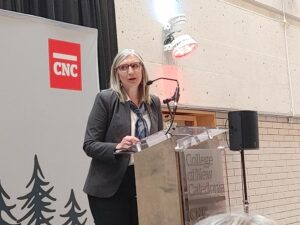From highs such as the introduction of the TekX program, to lows like the federal government further capping the number of international students allowed to study in Canada, 2024 has been an interesting year for the College of New Caledonia.
“I think some of the big highlights was the launching of our Indigenous education plan, as well as creating some new leadership positions here in Indigenous education,” said CNC President Cindy Heitman in an interview with My Cariboo Now.
“That is with hiring our Vice President, Dr. Jessie King and having Marlene Erickson, who’s been with the college for many, many years, move into a role of Special Advisor to the President in areas of policy and Indigenous relations, which really helps us navigate our relationship with truth and reconciliation as well as our commitments with DRIPA.”

Heitman says the next steps for the Indigenous Education strategy is to continue to move Indigenous Education in post-secondary.
“That looks like reviewing some of our systems and processes here at the College, where are there systemic barriers and how can we take those down so that we provide spaces for Indigenous learners to be successful, where their culture is appreciated and acknowledged within the walls of our campus,” Heitman explained.
“It also looks at ‘how does learning look different for Indigenous students’ for all students, so how do we Indigenize our curriculum and honour the history and the knowledge that comes from the First Peoples that we’ve benefitted from for so long, but we haven’t formalized it in an education form, and do we formalize it in a Western colonial way, or do we do it in a more culturally responsive way.”
Heitman added she would like to see more Indigenous students and staff at the College.
“In our college and in our region overall, about 20 per cent of our students are self-declared Indigenous students,” she said.
“That’s quite a high number for a college, but if you look at our region, we’re a large portion of the province, representing 22 First Nations, and that’s not including Urban-Indigenous families, people who’ve moved into this region from outside of the 22 First Nations.”
Heitman said another big positive for the College this year was the launch of the TekX program in collaboration with both UNBC and School District 57.
The new program gives Grade 11 students an introduction to the rapidly growing tech-sector, while earning post-secondary credits.
“It’s been a huge success, students are really enjoying it, we’re seeing some really positive outcomes, and an opportunity for growth,” Heitman said.
Heitman said the program has been so successful that Cedars Christian has joined the partnership agreement, allowing them to partake.
“I think what came out of this is a really good model that we can replicate for other areas of study, and we’re looking forward to more of those,” she explained.
“You think about the potential for high school students to receive a lot of post-secondary credits while they’re receiving credits for graduation in high school, it’s a draw.”
Heitman said the College is moving towards focusing on creating a more seamless transition and better bridging for high school students to move into post-secondary.
“If you think about that learning journey, that K-12 system, into a college system, up into a university system, we have the opportunity within our area and within our region to create a seamless education from kindergarden to where you want to be in life,” she explained.
“We just need to spend more time thinking about those pathways and the professions and the areas of study that students are interested in, so I can see more to come.”
In terms of what high school/post-secondary dual credit programs may come in the future, Heitman said those decisions will be geared around the labour market.
“We need to spend more time talking to students about what that could look like. We know that technology is a draw, so that was a really great place to start, but I start thinking about all the opportunities in healthcare and the allied health professions,” she explained.
“Sometimes students think healthcare, they think nursing and doctors, where there’s so many more other opportunities, and is there an option to introduce students through that way. I think about the resources, mining and forestry within our community and in our region, and is there an opportunity for us to develop some of these programs for students who are interested in those as well.”
Not everything has been a positive for the College in 2024.
Towards the end of this year, it was announced the College is anticipating an operating deficit in the 2025-2026 fiscal year, following a decline in international student enrolment, that could mean layoffs for some employees.
This followed the federal government announcing changes to regulations for international students to study in Canada, particularly reducing the number of international students allowed to study in Canada.
“In terms of the last time we’ve produced information, we’ve continued to look at budget, we’ve continued to look for efficiencies and how we can do things differently here at the College in order to respond to the decreased enrolment,” Heitman said.
“When we have decreased enrolment, we have decreased revenue, so we’ve been having to really look at all of our systems across the college and where we can find some efficiencies.”
Heitman noted they’re anticipating fewer students for the winter and fall terms, which will have an impact on the College.
“We continue to work with our provincial government, to work with our other colleges as well as stay informed about what’s happening federally, but I think we really need to think as a community and as a region how this is going to impact more than just the college at this time,” Heitman said.
“Typically we would see anywhere from 300 to 400 new students arrive in a term, which is significant for our college, a fulltime population of about 3,500 full-time students, about 1,000, a third of them are from overseas or international students.”
Heitman noted the College has been on a path to decrease the number of international students and have a better balance of domestic and international students.
“The rules that have come forward through the IRCC has just made that happen a little bit faster, but we are adjusting and making the necessary changes here at the College in order to respond to that decrease,” she said.
Heitman said having dual-credit programs like TekX could help with domestic recruitment.
“How do we ensure we are offering programs that students within this region and this province want so that they come to CNC,” she said.
“I do believe the partnerships with the School Districts, I do believe that looking at some of our programs, offering relevant areas of interest for all students of all ages will be a strategy for us going forward.”
Other memorable moments for the College in 2024 included several accomplishments achieved by students, donor and alumni contributions, and research with community impact.
As we look ahead to a new year, we’re reflecting on a year filled with achievements, events, and memories shared with our CNC community. 🎉
Here’s a countdown of our favorite moments from CNC campuses: https://t.co/Ii2X60Sx49 —stay tuned for Part II!#myCNC pic.twitter.com/u5xvu7LhQl
— College of New Caledonia (CNC) (@cnc_bc_ca) December 23, 2024
Part II is here.
We’re wrapping up our countdown with more unforgettable moments from CNC campuses this past year. From achievements to celebrations, these highlights reflect the heart of our CNC community.
Relive the memories: https://t.co/zjPXFdQ5lL #myCNC pic.twitter.com/jSBLskrV3C
— College of New Caledonia (CNC) (@cnc_bc_ca) December 24, 2024
Something going on in the Cariboo you think people should know about?
Send us a news tip by emailing [email protected].










